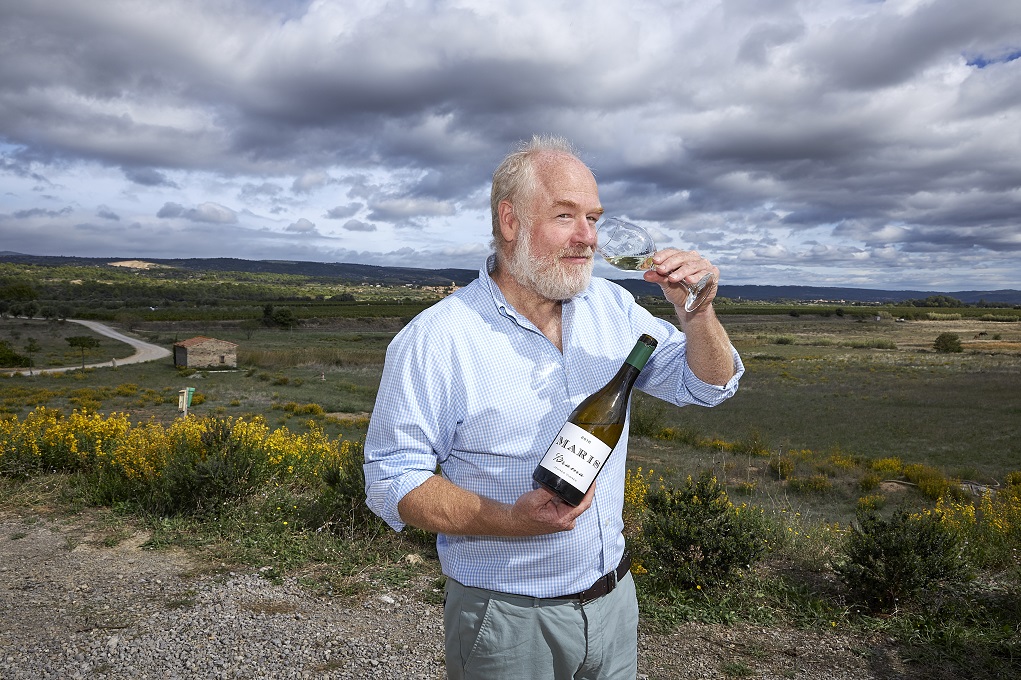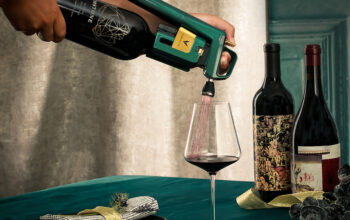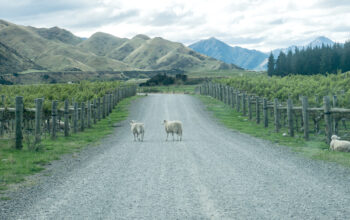Château Maris is booming in southern France. Winemaker Robert Eden - son of a former British minister - has been living in France since the 1990s after working with experienced winemakers all over the world. Our editor-in-chief Niek Beute interviewed Robert Eden. - TEXT NIEK BEUTE | IMAGE CHÂTEAU MARIS WINES
Château Maris
Eden, together with sustainable investor Kevin Parker, has owned Château Maris since 1997. Château Maris is located in the upper Minervois vineyards, in the Cru region of La Livinière. From the beginning in 1997, Château Maris' vineyards were gradually converted to the biodynamic seeding calendar. Here, the rhythm of the sun, moon, planets and stars determines harvest, sowing and winemaking.
Maris is considered a forerunner in sustainable agriculture. For example, the chais - the wine-making cellar - was the first in the world to be made of hemp. Hemp is an organic material that consumes CO2. The plant-based materials keep the chais at temperature; no cooling or heating is needed. Château Maris is largely self-sufficient, the stored CO2 is used and solar panels provide the electricity. Parker's Wine Advocate loves Château Maris' wines and consistently rates them above 90 points, Wine Spectator lists them as outstanding wines. Château Maris graces the wine list of many a top restaurant.
Interview Robert Eden
We begin our conversation with the charming and charismatic Robert Eden, asking him how he got into the wine business.
Robert grew up in a traditional British family. The 'Sunday roast' was an important family moment. As the eldest son, he was allowed to join his father in the cellar on Sunday mornings to pick out the wine of the day. Of course it was Clairet, which we know better as Bordeaux. With a big smile, he tells about his father who was very pompous about wine, but actually had very little awareness of it. Nevertheless, the moment was special. Tasting wine in the morning before going to church with his father, and that at the age of ten.
His father saw his interest growing and encouraged it. He bought the Hugh Johnson's wine atlas for his birthday. And instead of a trendy bike or moped, he got a case of Château Margaux. His interest in the making of wine gave him the idea to buy a home-brew kit for beer and see how fermentation works. He made more than he could finish himself and sold some to boys at school. The beer did not go down well with the boys and it got him into quite a mess.
Shortly after the beer incident, Robert left for Australia at the age of 17. From Adelaide, he jumped on a motorbike and drove to the beating heart of Australian viticulture, to the Barossa Vallee. This is where he apprenticed. From pruning to winemaking, he got to do and learn everything. There was no better way to get embroiled in the wine industry.
 How did you get to Château Maris justified?
How did you get to Château Maris justified?
It was in 1986 that I was working as a consultant in Burgundy. A client was looking for an affordable Chardonnay. To find it, I went to the southern French town of Limoux. The route took me through the beautiful and unspoilt Languedoc region. Time seemed to stand still here. Beautiful nature and picturesque villages. I decided to take a few days off and explore the area. The area made a big impression on me. Back in Burgundy, I delved further into the region and all its wines. I bought all the captivating wines from the area and slowly became a connoisseur of everything there.
Through a local estate agent, I was offered the wine domain Château Maris. The domain was in a particularly sub-area of the Minervois called La Livinière. An area inland from the city of Béziers in the southern part of Languedoc. In reality, it was not a fancy Château, but a winery located in the village with a fragmented vineyard area. Not an interesting option for many, but instead I saw the potential of the many different terroirs, despite the hard work involved.
Robert bought the estate in 1994 with his business partner Kevin Parker, who was a big collector of Burgundy wines. After the first harvest, the plan was soon forged to turn it into an organic winery. The first few years were difficult. The vineyards had been farmed in a conventional way for a long time and had suffered considerably. Robert bought large quantities of biodynamically prepared compost to revitalise the vineyards. Gradually, the vineyards came back into balance and steps could be made to make the entire winery biodynamic. It was only in 2007 that the entire vineyard acreage had returned to optima forma and all the vineyards were presenting wonderfully energetic grapes.
 The cellar
The cellar
Robert soon bought a derelict linen factory on the outskirts of La Livinière. Here he built a state-of-the-art winemaking facility. Everything was top quality. But when the first harvest came in, he was disgusted by what he had put here. It did not correspond at all with the very vineyard management that was so connected to nature. It had nothing to do with the biodynamic principles of viticulture. That same year, he sold the facility and started looking for a solution that was in line with the philosophy of the estate.
A building was created that is almost entirely biodegradable and incorporates the energy of nature. It went so far that even the walls were constructed from blocks of recyclable hemp concrete blocks. And a roof made of grass. As little use as possible is made of steel, which conducts energy. And Robert actually wants to create as neutral an environment as possible for the wines to come to fruition. It is a unique building and hopefully an inspiration to others who envision a nature-friendly wine future.
La Livinière
A special part of the Minervois. Where the vineyards lie in a bowl, with their backs against the mountainside. The large difference in altitude provides cooling air that flows from the mountains into the vineyards. The warm valley breeze also passes by La Livinière. This particular part of the Minervois even gained its own cru status in 1998. A confirmation for Robert that this is genuinely a special place.
How do you deal with climate change?
Above all, as winemakers, we should not think we are in control of nature. We deal with the situations that arise. I am mainly concerned with the health and resilience of my vineyards. It is especially important to create as much life in the vineyard and soil as possible. Biodiversity plays a big role here. The many species of plants and animals create a natural balance in the vineyards. Which in turn ensures that the vines become more resilient and can better cope with the extremes that can occur. Biodynamic is therefore not only important for healthy viticulture, but also gives more stable and better wines.
 Tasting Together
Tasting Together
There is nothing more fun than tasting wine with the winemaker himself. We taste an amazingly energetic red wine, and a white wine of truly grand allure.
Château Maris 'La Touge' Minervois, Cru La Liviniere 2018
It is a blend of many vineyards and a mix of 60% Syrah and 40% Grenache Noir. Robbert tells us that he wanted to make a lively wine in which the energy of the vineyard comes out strongly. With every sip you taste the charm of the south, with the soft spiciness of Languedoc wines combined with a super juicy fruit expression. Maturation in concrete egg-shaped barrels means the wine has no raw stiff tannins but is fluid and thirst-quenching. And the clever thing is that the wine does not sacrifice character. Tasting this wine, we can't wait for the next Barbecue, this is definitely going to be drunk then.
Château Maris 'Brama' Vin de France 2018
A special white wine, which Robert also really sits down for. So we taste it after the red wine. The reason quickly becomes clear. A gem from the Chateau Maris stable. Made from Grenache Gris. It is a speckled grape, often used for rosé production due to its light pigmentation. First made in 2011, this wine is still a very small production. Only 3,400 bottles reach the market every year, which is nothing compared to the 100,000 bottles of 'La Touge'.
In contrast, this wine makes such an impression that you also never need more than 1 bottle of it per month, never to leave your mind. The wine went through its fermentation and ageing partly in concrete vats and partly in wood. Only two years after harvest, the bottles leave the estate to hopefully go through more bottle maturation before it needs to tell its story.
It is a wine of great richness and opulence, with an unctuous and almost waxy mouthfeel. In doing so, it is reminiscent of the great classic Southern Rhone wines. But it wouldn't be a Chateau Maris wine if it wasn't also energetic and resilient. It has all the elements to amaze you. Perfume and rich fruit, minerality, bitters and dynamism. And then the opulent depth and grand length in the finish. If you don't sit still for it, you will. A wine for a great moment, one you'll want to share with those you hold dear.
 Future
Future
At the last minute, Robert expresses his hopes for the future.
With all the challenges facing our world, we will have to look for sustainable solutions together. Keeping talking to each other, seeing and hearing each other. Not isolating ourselves, but learning from each other. Going to the table together, eating and drinking together. This is where understanding is created and ideas emerge. Let a glass of wine be the invitation to a special moment together.
We could not have imagined a more beautiful ending to an already impressive encounter. And we are already looking forward to another 'rendezvous'
Win one of the four finest bottles of Château Maris wines
We are allowed 4 times one of the most beautiful Château Maris wines to give away!
You can participate by our and Cordier Wines to follow on Instagram.
In the post about Château Maris wines, tag your friends, family and/or colleagues with whom you would like to drink one of the finest Château Maris wines, why and which bottle of wine you would like to win.
You can enter until 28 June 2022.
This article was produced in collaboration with Cordier.
Don't want to miss a single edition? Subscribe then subscribe to WINELIFE Magazine now!
Want to stay up to date with the best articles? Follow WINELIFE magazine on Instagram, Facebook and sign up for our fortnightly newsletter.




